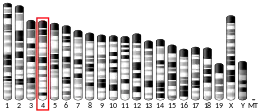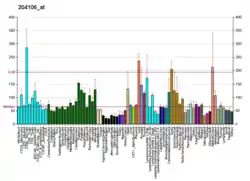TESK1
Dual specificity testis-specific protein kinase 1 is an enzyme that in humans is encoded by the TESK1 gene.[4][5]
Function
This gene product is a serine/threonine protein kinase that contains an N-terminal protein kinase domain and a C-terminal proline-rich domain. Its protein kinase domain is most closely related to those of the LIM motif-containing protein kinases (LIMKs). The encoded protein can phosphorylate myelin basic protein and histone in vitro. The testicular germ cell-specific expression and developmental pattern of expression of the mouse gene suggests that this gene plays an important role at and after the meiotic phase of spermatogenesis.[5]
References
- GRCm38: Ensembl release 89: ENSMUSG00000028458 - Ensembl, May 2017
- "Human PubMed Reference:". National Center for Biotechnology Information, U.S. National Library of Medicine.
- "Mouse PubMed Reference:". National Center for Biotechnology Information, U.S. National Library of Medicine.
- Toshima J, Ohashi K, Okano I, Nunoue K, Kishioka M, Kuma K, Miyata T, Hirai M, Baba T, Mizuno K (December 29, 1995). "Identification and characterization of a novel protein kinase, TESK1, specifically expressed in testicular germ cells". J. Biol. Chem. 270 (52): 31331–7. doi:10.1074/jbc.270.52.31331. PMID 8537404.
- "Entrez Gene: TESK1 testis-specific kinase 1".
- Toshima JY, Toshima J, Watanabe T, Mizuno K (November 2001). "Binding of 14-3-3beta regulates the kinase activity and subcellular localization of testicular protein kinase 1". J. Biol. Chem. 276 (46): 43471–81. doi:10.1074/jbc.M104620200. PMID 11555644.
- Leeksma OC, Van Achterberg TA, Tsumura Y, Toshima J, Eldering E, Kroes WG, Mellink C, Spaargaren M, Mizuno K, Pannekoek H, de Vries CJ (May 2002). "Human sprouty 4, a new ras antagonist on 5q31, interacts with the dual specificity kinase TESK1". Eur. J. Biochem. 269 (10): 2546–56. doi:10.1046/j.1432-1033.2002.02921.x. PMID 12027893.
Further reading
- Toshima J, Tanaka T, Mizuno K (1999). "Dual specificity protein kinase activity of testis-specific protein kinase 1 and its regulation by autophosphorylation of serine-215 within the activation loop". J. Biol. Chem. 274 (17): 12171–6. doi:10.1074/jbc.274.17.12171. PMID 10207045.
- Røsok O, Pedeutour F, Ree AH, Aasheim HC (1999). "Identification and characterization of TESK2, a novel member of the LIMK/TESK family of protein kinases, predominantly expressed in testis". Genomics. 61 (1): 44–54. doi:10.1006/geno.1999.5922. PMID 10512679.
- Toshima J, Toshima JY, Amano T, Yang N, Narumiya S, Mizuno K (2001). "Cofilin phosphorylation by protein kinase testicular protein kinase 1 and its role in integrin-mediated actin reorganization and focal adhesion formation". Mol. Biol. Cell. 12 (4): 1131–45. doi:10.1091/mbc.12.4.1131. PMC 32292. PMID 11294912.
- Toshima J, Toshima JY, Takeuchi K, Mori R, Mizuno K (2001). "Cofilin phosphorylation and actin reorganization activities of testicular protein kinase 2 and its predominant expression in testicular Sertoli cells". J. Biol. Chem. 276 (33): 31449–58. doi:10.1074/jbc.M102988200. PMID 11418599.
- Toshima JY, Toshima J, Watanabe T, Mizuno K (2001). "Binding of 14-3-3beta regulates the kinase activity and subcellular localization of testicular protein kinase 1". J. Biol. Chem. 276 (46): 43471–81. doi:10.1074/jbc.M104620200. PMID 11555644.
- Leeksma OC, Van Achterberg TA, Tsumura Y, Toshima J, Eldering E, Kroes WG, Mellink C, Spaargaren M, Mizuno K, Pannekoek H, de Vries CJ (2002). "Human sprouty 4, a new ras antagonist on 5q31, interacts with the dual specificity kinase TESK1". Eur. J. Biochem. 269 (10): 2546–56. doi:10.1046/j.1432-1033.2002.02921.x. PMID 12027893.
- LaLonde DP, Brown MC, Bouverat BP, Turner CE (2005). "Actopaxin interacts with TESK1 to regulate cell spreading on fibronectin". J. Biol. Chem. 280 (22): 21680–8. doi:10.1074/jbc.M500752200. PMID 15817463.
- Rual JF, Venkatesan K, Hao T, Hirozane-Kishikawa T, Dricot A, Li N, Berriz GF, Gibbons FD, Dreze M, Ayivi-Guedehoussou N, Klitgord N, Simon C, Boxem M, Milstein S, Rosenberg J, Goldberg DS, Zhang LV, Wong SL, Franklin G, Li S, Albala JS, Lim J, Fraughton C, Llamosas E, Cevik S, Bex C, Lamesch P, Sikorski RS, Vandenhaute J, Zoghbi HY, Smolyar A, Bosak S, Sequerra R, Doucette-Stamm L, Cusick ME, Hill DE, Roth FP, Vidal M (2005). "Towards a proteome-scale map of the human protein-protein interaction network". Nature. 437 (7062): 1173–8. Bibcode:2005Natur.437.1173R. doi:10.1038/nature04209. PMID 16189514. S2CID 4427026.
This article is issued from Wikipedia. The text is licensed under Creative Commons - Attribution - Sharealike. Additional terms may apply for the media files.


